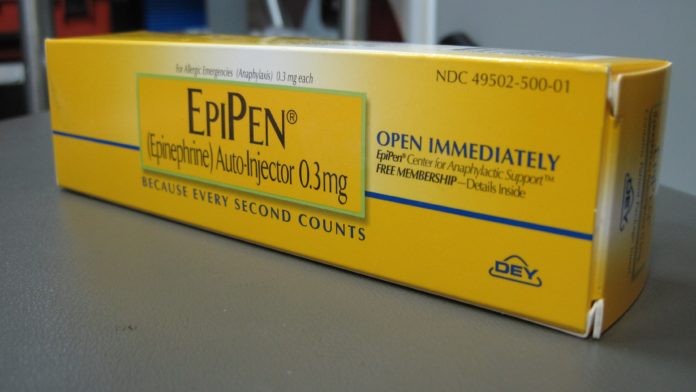Few things are more terrifying than experiencing or even witnessing anaphylaxis. Often triggered by either an unknown allergy or a dangerous stowaway in one’s meal, the result is the rapid onset of shock, debilitation, and often inexpressible panic.
Breathing abilities deteriorate quickly, the face engorges, hives appear, and faint arrives shortly thereafter. Left untreated, victims can succumb in minutes if the reaction is serious enough.
Recent high-profile cases in Canada have inspired debate over whether the allergic equivalent of a defibrillator – an EpiPen – should be mandatory in public eateries, if not the wider public. In 2013, an 18-year-old Hamilton student lost her life after exposure to peanuts in her smoothie, and in 2016, a man in Quebec narrowly survived an encounter with salmon following a server’s misstep with his order.
EpiPens offer immediate relief from anaphylaxis. They decrease swelling, relax airways and cut down the number of allergenic chemicals coursing through one’s body, saving lives and mitigating symptoms for those undergoing the terrifying experience.
So surely they should be planted in public spaces everywhere in case of an emergency, right? Unfortunately, it’s not so simple.
Legal and practical realities remain hurdles
Last year, Toronto City Councillor James Pasternak filed a motion proposing that all restaurants should have an EpiPen available in case of an emergency, but business owners found the idea to be highly controversial.
Beyond the costs involved in paying $120 for a fresh EpiPen every 12-18 months and training staff, the allocation of sole responsibility on the establishment is a step too far for them.
Several commentators have suggested that incorrect application or application under a mistaken diagnosis of anaphylaxis could prove disastrous for a sufferer who may instead be choking – the epinephrine (otherwise known as adrenaline) in an EpiPen may stir an underlying heart problem, as an example.
This legal quagmire of liability and responsibility, both for the immediate staff members and management, incited backlash from the industry and led to the dismissal of the motion, much to the dismay of supporters.
Pasternak was deeply frustrated at the result: “The restaurant industry has to see this as a good business move,” he said. “Restaurants are required to stock fire extinguishers; those are expensive, they expire. How is this any different?”
Is the restaurant industry overreacting?
McMaster University professor and allergist Susan Waserman believes that the restaurant industry is off the mark: “The sort of things that stand in the way of bringing it in are probably a lack of information and education on the part of people making decisions,” she said in an interview with CTV News last year.
Waserman claims that EpiPen training is simple, and that fears over adverse reactions in a case of misdiagnosis are exaggerated given the relatively small dose of epinephrine in an EpiPen.
“You might get a rapid heart rate, you may get a tremor. There are really very few contraindications to giving epinephrine,” she added.
Similarly, Beatrice Povolo from Food Allergy Canada commented that a line of defence needs to be there in cases where the sufferer was previously unaware of a serious allergy.
“They can also be useful in situations where someone has never had a serious reaction before,” said Povolo. “There’s definitely some very positive applications and outcomes and they could potentially save lives.”
Whatever one’s opinion might be, nothing can be implemented if there aren’t bountiful supplies of EpiPens around; and right now Canada is nearing a crisis, with low numbers in pharmacies nationwide.
‘Manufacturing issues’ have led to backlogs in demand along with recalls for defective units; meanwhile, rates of allergy-sensitive individuals continue to soar. Distribution in Canada is solely organized by Pfizer Canada, and this monopoly on the Canadian market was cited as the biggest problem in recuperating stocks by Andre Picard in a Globe and Mail opinion piece last August.
Pfizer has provided no definitive date for when stocks will return.
A proactive, sensible approach will save lives
While this multi-faceted debacle unfolds, there are proactive steps that consumers can take to ensure their safety.
If you have a known, high-risk allergy, it’s vital to ensure you have your EpiPen with you when you eat out, as well as informing family, friends and other relevant individuals of your allergic sensitivities. A McMaster study found that only 10% of those who died from anaphylaxis had an EpiPen on them at the time.
For those anxious about being accidentally exposed to a life-threatening allergen, rest assured that such cases are very rare indeed. A 2014 review study found that between 1986 and 2011, only six Ontarians died from a food allergen they weren’t aware of. Around 15 Canadians die from anaphylaxis annually.
Looking forward, the city of Hamilton took up a pilot project aimed at incorporating EpiPens across public spaces in response to the 2013 tragedy. Malls and recreation centres have received stock, but the real goal is to blaze trails by including them in all 2,000 restaurants in the city.
Strange as it may seem now, defibrillators were also once seen as unwieldy, expensive, and legally ambiguous devices that spooked employers, politicians, and business owners. It’s far from certain that EpiPen will reach the same status, but it’s possible that one day, they will be as integrated and normalized as other emergency tools.








































